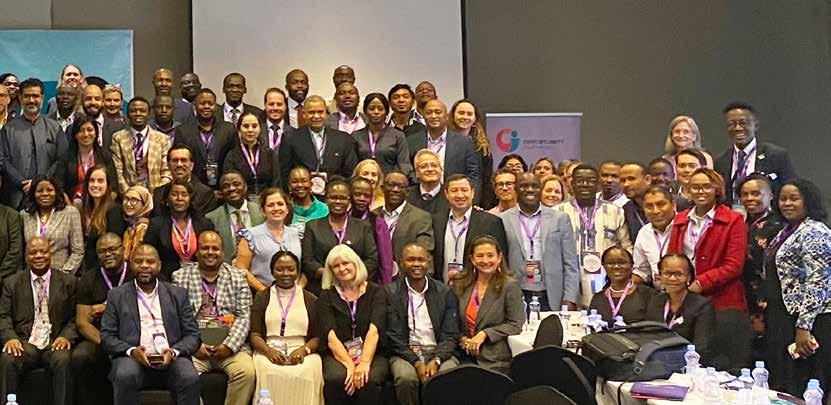2022 GLOBAL EDUCATION FINANCE CONFERENCE

Post-Conference Report
Nairobi, Kenya






This year’s Global Education Finance Conference, hosted by Opportunity International EduFinance in Nairobi, Kenya brought together 155 attendees from 37 countries, including financial institutions, impact investors, development finance institutions, bilateral funders, researchers and more. Of the 100 organizations represented, 79 were financial institutions from 22 countries across Africa, Asia and Latin America. The conference theme highlighted the link between the business case for education financing and the aim of Sustainable Development Goal #4 – quality education for all.
Over three days attendees –
1 2 3
Examined
Discussed
Considered innovations that can contribute to growing sustainable EduFinance portfolios
(next page)
what the research says about market demand for education financing
and shared evidencebased best practices based on attendees’ experience lending to affordable schools and parents
The conference format was designed to keep all attendees in the room together for a wide range of peer-to-peer learning and knowledge sharing opportunities. They raised challenging questions to presenters, panelists and one another on how to solve common challenges and learn from the successes of other financial institutions lending in education. Despite reasonable expectations that fears of competition would limit meaningful sharing between institutions, attendees far exceeded expectations with open, transparent questions and reflections in the spirit of collaboration and learning.


EduFinance Technical Assistance & EduQuality


EduFinance Technical Assistance
Support Members
Colombia, Dominican Republic, Ecuador, El Salvador, Guatemala, Haiti, Honduras, Paraguay, Peru
Democratic Republic of Congo, Ghana, Ethiopia, Kenya, Liberia, Madagascar, Malawi, Mozambique, Nigeria, Rwanda, Senegal, Tanzania, Uganda, Zambia, Zimbabwe
Cambodia, India, Indonesia, Nepal, Pakistan, Philippines

⊲ The EduFinance Market Opportunity
⊲ Sharing Personal Experience: Education Lending & Why Education Matters
⊲ Designing Loan Products that Meet the Needs of Schools
⊲ Unlocking the Barriers to Effective School Lending
⊲ Growing a Profitable School Fee Loan Product
Attendees received a pre-released copy of the latest State of the Affordable Non-State School Sector report, and learned what the research says about market demand for education financing, estimated at US$36 billion. This includes the need to add 56 million additional seats for children in affordable non-state schools through 2025 to keep up with demand trends.
During the panel on sharing experiences in education lending –
⊲ Kamram Azim of Taleem Finance Pakistan noted that ‘passion and resilience is a must’ for any institution working in EduFinance. He also framed the mission in the context of the pandemic, stating the “vaccine” we are working on is education that will save future generations.
⊲ Bunmi Lawson of EdFin Microfinance Bank Nigeria outlined the ways the bank addressed the many challenges brought on by COVID-19, and emphasized the opportunity to consider the full value chain for education lending – schools, parents and other education service providers.
⊲ Sandeep Wirkhare of Indian School Finance Company reflected on the opportunities in technology to advance education lending, from lowering operating costs, reducing approval time for education loans, and automating underwriting, to providing digital school fee collection platforms to partner schools.
⊲ Roberto Gimenéz of Fundacion Paraguaya pointed to the way the pandemic showed the many needs existing within the education sector, from infrastructure and working capital, to investments in technology and developing trust between schools and financial institutions. He emphasized that portfolio quality is ultimately driven by good training of staff offering the financing, appropriate product design adapted to demand, and good credit analysis including factors such as student enrolment and school reputation in the community.
The discussion took a more personal tone when a new panel was asked to share why education matters.
⊲ Simón Ziba of Vision Fund Zambia reminded everyone that education is not a given for many children, and yet education lets us break poverty patterns and is the best equalizer in a society.


⊲ Atul Tandon of Opportunity International shared his personal educational journey that started in India and the opportunities that led him to college. He posed the question of how we create systemic solutions to structural problems that limit access to quality education for all, and challenged philanthropic capital to invest in opportunities that further mobilize private capital investment in affordable education.
⊲ Emilio García of Coopsama Guatemala explained that thanks to the effort made by his dad he was able to attend school and educate himself. Without this opportunity he would not be the CEO of the cooperative where he has worked his way up for the past 30 years.
Additional sessions focused on the opportunities of education lending when looking at the full education ecosystem, anchored by the local school at the center. The ‘ecosystem’ approach unlocks synergies between the financial institution and school owners, parents, teachers, and school suppliers that can benefit and meet the needs of all stakeholders.

⊲ Growing your Education Finance portfolio
⊲ Increasing the Profitability of your Education Finance Portfolio
⊲ Innovative Education Finance Products
⊲ Financing Schools Beyond Collateral: A Digital Solution
⊲ Limiting Arrears of my Education Finance Portfolio
⊲ Funding my Education Finance Portfolio
⊲ The Financial, Marketing & Social Benefits of Improving School Quality for Lenders
One of the ways EduFinance supports financial institutions to grow Education Finance portfolios is through the ‘School Leadership Academy.’ These workshops aim to increase lending to unbanked schools by bringing together school owners and financial institutions. Financial institutions that have participated in School Leadership Academy workshops to date shared their experiences.
When you bring schools owners together you are able to hear different experiences and learn from each other. During COVID we had a lot of challenges, what we were doing was not really aligned with what was happening on the ground. We got to understand this thanks to the workshops….
We are not enemies, we are partners. We are trying to help you…In the past school leaders have been ‘enemies’ with financial institutions. The School Leadership Academy is an opportunity to set differences aside.
– Chilufya Siansangu, EFC Zambia
A role play set in a local branch office where an unbanked school owner sought information from a very unhelpful loan officers provoked laughter from the audience, while also resonating with attendees that further shared their takeaways:



⊲ Loan officers need to be trained, not only on the ‘script’ but also how to handle people. If you don’t build this capacity within your staff, you will lose clients.
⊲ The biggest challenge is the [staff] mindset. There needs to be a value besides the loan, like mentorship, training, etc.
⊲ It is very important to work on a communication matrix to put expectations in place… there is reputational risk when potential clients are poorly served.
⊲ Service attitude is everything. You have to be consistent.
⊲ The business is not financial; it is a service…as leaders you can have the vision, but you have to align with the rest of the work team.
Attendees also reflected on a range of innovative Education Finance products, including gender centric products offered by Kashf in Pakistan to school payment platforms such as SchoolPay enabling cash-flow based lending approaches.
Oiko Credit and Blue Orchard then shared ways financial institutions could apply for capital to fund new and growing Education Finance portfolios.

Attendees were asked to share their takeaways and reflections on the conference content and presentations by their peers. Reflections included –
⊲ Now looking at education financing differently than other lending
⊲ See a greater need to understand what the school’s challenges are and see how the financial institution can address them

⊲ Sharing knowledge and experiences in education financing is relevant even across regions, and can be used by financial institutions to better offer tailored solutions
⊲ Financial institutions have an opportunity to mentor and advise local school owners; mentorship can lead to greater impact
⊲ Institutions should prioritize building relationships with schools even before looking at the ‘transaction level’ opportunities
⊲ Microfinance started as a way to reduce poverty, and education financing is fully aligned with this mission, as quality education improves lives
The post-conference survey also asked attendees to share “What actionable information did you learn that will help you in your work life?” Responses included –
⊲ How to add non-financial services to support schools
⊲ Digital approaches to school fee lending
“It is worth it to be here and worth it to bet on education.”
– Roberto Gimenéz of Fundacion
⊲ Huge market size for education financing creating a huge opportunity for funding
⊲ Knowing and informing other actors in the education finance space can grow education finance portfolios through information sharing and exchange of experience
⊲ Meeting a private school association

⊲ Focusing on bespoke product design while ensuring the products reduce educational inequalities
⊲ School products should be stand alone and not generic products
⊲ The social impact and value chains in the education ecosystem

⊲ Deepening appreciation of the importance of this work and a renewed commitment to support it

Peer-to-Peer learning is core to the EduFinance model. Financial institution working to build sustainable EduFinance portfolios are best positioned to share their experiences and learnings to benefit the Opportunity EduFinance partner network. Attendees exemplified this commitment to networking and peer-to-peer learning throughout the conference, willingly sharing experiences, challenges and asking questions of their peers across difference countries and regions. The Networking Reception provided attendees a further opportunity to continue these deep dive discussions. Postconference survey responses also found that attendees took opportunities to network, and some found it so valuable they would prefer more networking time at future conferences.














On Day 3, attendees were offered the chance for a field trip, leaving the comfort of the conference room for a 30-minute bus ride to a local school in Nairobi. Dividing the group between two school locations, school owners graciously shared not only their school’s origin story, but the details of how they funded, grew and continue to invest in their school. They shared their vision for their schools, the challenges of buying land, the number of girls they provide monthly sanitary napkins to because they wished someone had done it for them. They brought to life what a school actually is and can be – a safe, supportive, enabling environment for all learners.








Opportunity International EduFinance is a global non-profit organization that partners with financial institutions around the world to help them develop, launch and grow sustainable education lending portfolios, primarily focusing on two flagship products: School Improvement Loans and School Fee Loans. The EduQuality Program at Opportunity EduFinance offers school borrowers capacity building and training to run sustainable, quality schools.
OPPORTUNITY EDUFINANCE INVESTS IN ACCESS TO QUALITY EDUCATION

Opportunity EduFinance partners with financial institutions to mobilize capital to school owners & parents, and boosts the capacity of school leaders & teachers.
FINANCIAL INSTITUTIONS INVEST IN SCHOOLS AND PARENTS
Financial institutions provide essential education financing through school improvement loans and school fee loans.

LEARNERS ENGAGE IN LESSONS
Teachers actively engage learners and provide quality instruction that drives learning.
TEACHERS DEVELOP THEIR SKILLS
Teacher mentors provide ongoing lesson observations and feedback to teachers to continue developing their skills.
MORE CHILDREN ARE LEARNING AND HAVE ACCESS TO QUALITY EDUCATION.
SCHOOL OWNERS INVEST IN ACCESS & QUALITY
School owners invest in more seats and education quality improvements at their schools.
PARENTS INVEST IN THEIR CHILDREN
Parents access school fee loans to invest in all of their children’s education.
SCHOOL LEADERS MANAGE SUSTAINABLE, QUALITY SCHOOLS
School leaders have the financial, business management and instructional leadership skills necessary to manage high performing schools.
As of November 2022, Opportunity EduFinance has partnered with 134 Financial Institutions in 30 countries to collectively invest more than US$564 million in education. Currently over 15K schools and 78K parents are borrowing from financial institution partners worldwide to invest in education access and quality. Opportunity EduFinance is proud to work alongside our network of global partners, benefiting an estimated 11 million children since the start of the programme to access quality education.
134
US$
Financial Institution Partners Schools borrowing
15k
Countries Parents borrowing
30 78k 11mn
564mn In Education
Children benefitting
Discover more at edufinance.org or join the conversation on Facebook, Twitter, or LinkedIn.

Visit us at edufinance.org
© 2022 Opportunity International. Opportunity International’s Education Finance program operates with charitable support from Opportunity’s global network. Opportunity International United States is a 501(c)(3) non-profit (EIN 540907624); Opportunity International United Kingdom is a registered charity in England and Wales (1107713) and in Scotland (SCO39692); Opportunity International Canada is a registered Canadian charity #877516385RR0001; Opportunity International Australia is a registered charity (ABN 83 003 805 043). Opportunity International serves all people regardless of race, religion, ethnicity, or gender.
